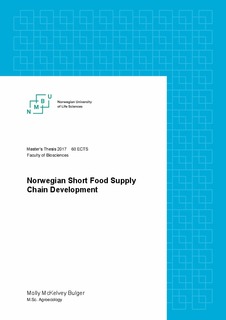| dc.description.abstract | Agro-food systems around the globe are consolidating and homogenizing. In response, they are also segmenting and diversifying. The emerging agro-food networks fit into what scholars describe as economic and rural development paradigm shifts, partly in response to many clarion calls within academia and civil society for change in agro-food system priorities. There is an ever-widening body of interdisciplinary research on these reactionary agro-food systems, which take various names, including alternative food networks, civic food networks, and short food supply chains. Research focuses on the reasons these emerging food systems are developing, the motivations of the actors involved, and the diversity of activity happening around the world in this field. However, research has not focused on what causes these emerging food systems to succeed in achieving their motivations, or what restricts their growth; literature does not cover which best practices enable success for these emergent food systems, and what causes them hardship. This study aims to fill this gap in the research, through a case study in Norway that focuses on short food supply chains (SFSCs) in Norway as a case study. Kurt Lewin’s Force Field Analysis technique helps identify the forces that support or hinder the development of these SFSCs. Conducting this study in Norway allows contemplation of SFSC development in the relatively rich Global North, in a country with what some consider “harsh” (Flaten & Hisano 2007; Vinge 2015) agroecological conditions. Scholars have not extensively studied the unique Norwegian context, where conversations around whether to protect and promote localized farming systems or further modernize and liberalize the nation’s agriculture are current and contentious. | nb_NO |

